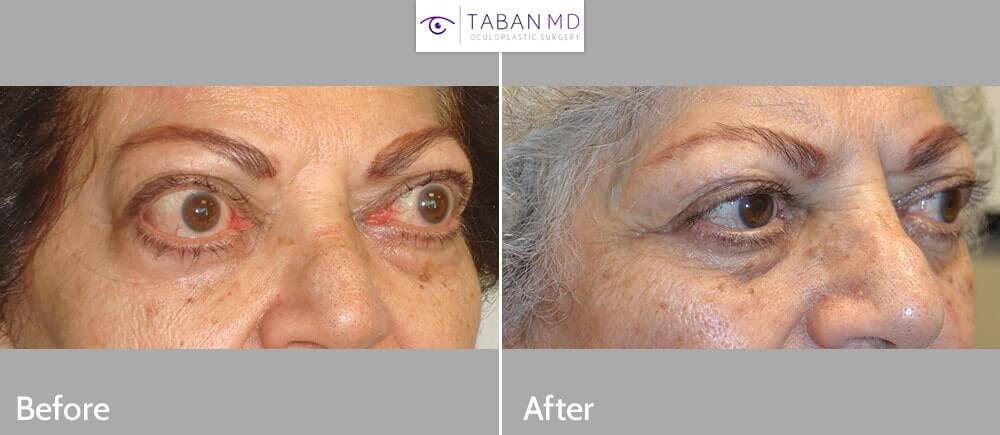
Treating exophthalmos Treatment for exophthalmos will depend on the underlying cause. You may also have a blood test or a thyroid function test to check that your thyroid gland is working properly. If the ophthalmologist wants to examine your eye socket in more detail, a scan such as a computerised tomography (CT) scan or magnetic resonance imaging (MRI) scan may be used. They may also use an instrument called an exophthalmometer to measure how far your eyeball protrudes. The ophthalmologist will check how well you are able to move your eyes. Your GP may refer you to an ophthalmologist (a specialist in diagnosing and treating eye conditions). However, further tests will be needed to confirm a diagnosis. How much the eyeball bulges, the direction it protrudes and any other associated symptoms will often provide clues about the underlying cause. Diagnosing exophthalmos Exophthalmos is often easy to recognise from the appearance of the eyeballs, which clearly bulge or protrude from the sockets, exposing most of the whites of the eyes. In some cases, it can also cause proptosis. A pleomorphic lacrimal gland adenoma is a painless, slow growing eye tumour that can develop in adults in their 50s. For example, a capillary haemangioma is a type of tumour that can develop in the eye cavity (orbit) during childhood. Exophthalmos is sometimes related to tumours (growths) that develop in the eyes. An overactive thyroid gland can sometimes lead to a thyroid eye disease and symptoms such as puffy, swollen eyes, tearing and bulging eyeballs.

A thyroid condition that affects the eyes is known as thyroid eye disease or thyroid orbitopathy. The thyroid is a small gland at the base of the throat that controls your metabolism (the rate at which your body uses energy). Conditions that affect the thyroid gland are a fairly common cause of exophthalmos. It is important that the underlying cause is identified so that appropriate treatment can be given. What causes expohthalmos? Exophthalmos can be caused by many different conditions. Your vision may also be affected - for example, you may have double vision or some loss of vision. For example, if exophthalmos is caused by a thyroid-related condition, such as Graves' disease, as well as bulging, your eyes may also be: inflamed, red and painful, dry and 'gritty', tearful, sensitive to light (photophobia). Depending on what is causing exophthalmos, as well as bulging eyes, you may also have a number of other associated symptoms.

Proptosis is also a term that describes bulging eyeballs, although it is often used when only one eyeball protrudes. Exophthalmos is a Greek word that means bulging or protruding eyeballs.


 0 kommentar(er)
0 kommentar(er)
